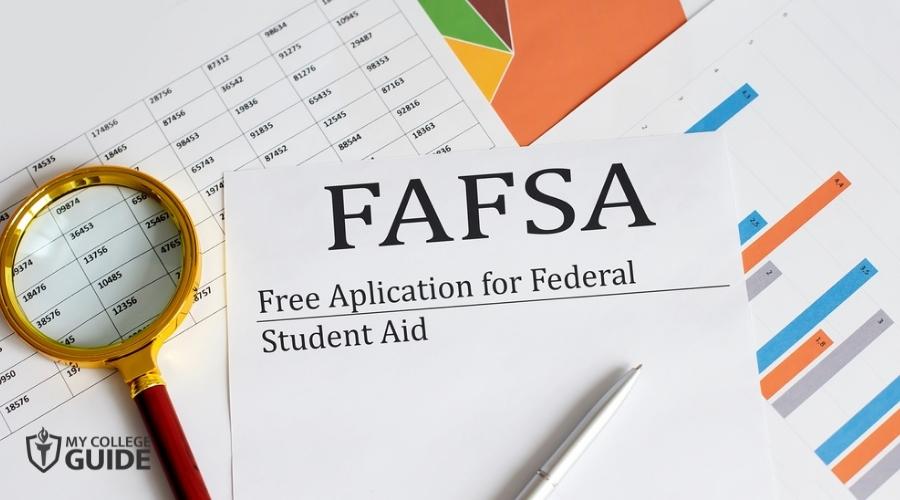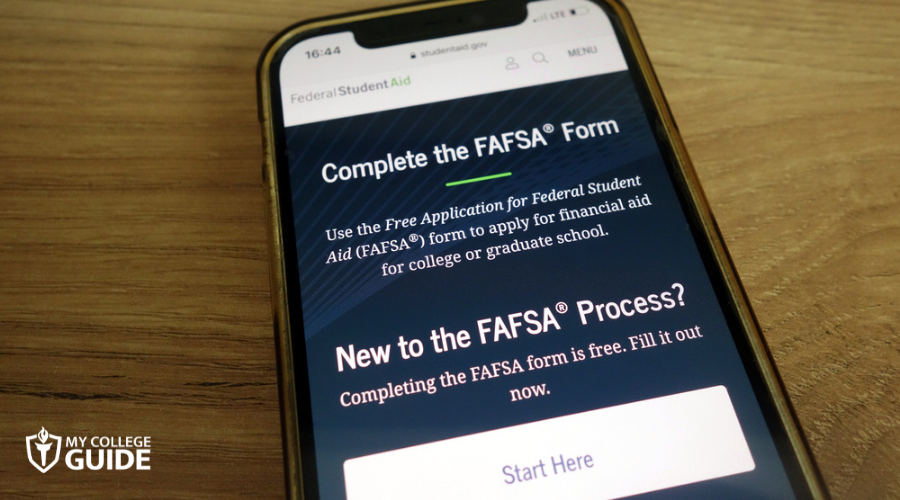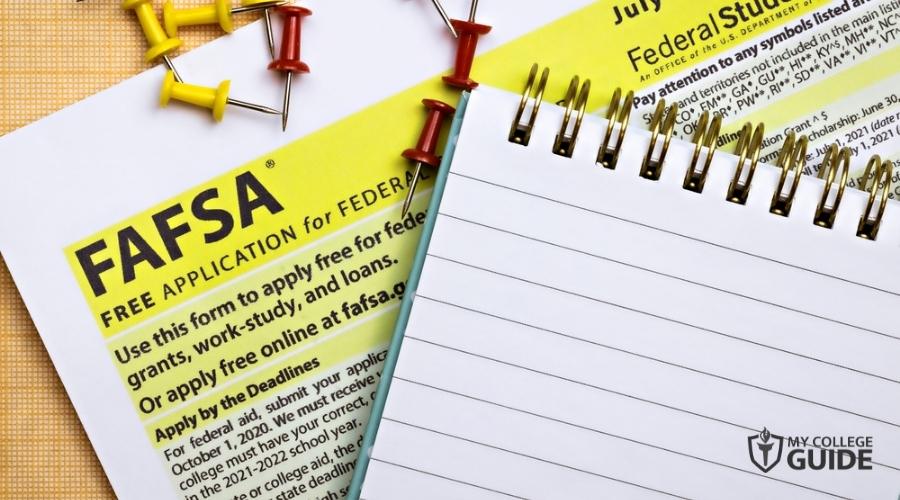When planning your college career, financial aid can be a huge factor in your decision to attend a specific school. One of the biggest questions asked by students is: How am I going to pay for college?

Luckily, regardless of your chosen career path or prospective schools, there are many programs available to help you pay for your college education.
Editorial Listing ShortCode:
We’re going to break down everything you need to know about financial aid.
What is Financial Aid for College?
Financial aid is any type of money for college students that helps them pay for tuition and associated costs. Financial aid comes in many forms including grants and scholarships, both of which do not have to be paid back, loans, and work-study programs.
Financial aid is awarded based on your financial need and your family’s financial situation. Financial aid can come from the federal government in the form of a grant by filling out the Free Application for Federal Student Aid (FAFSA). However, your school may also offer financial aid in the form of a financial aid package.
Editorial Listing ShortCode:
Scholarships are also available to help you pay for college. They can be awarded based on financial need but also can be awarded based on merit, talents, and other deciding factors set forth by the scholarship. It’s important to research various scholarships and apply to those that you feel you qualify for.
Student loans are also available to help you finance your college education. Loans must be repaid after you graduate from school.
Overcoming Sticker Shock

Over the last several decades, college tuition has increased dramatically. Naturally, the sticker shock of college tuition can be a cause of concern for many students and families, but there are ways to negate the high price tag and still achieve your education goals.
According to the College Board, the average tuition cost for full-time students (in-state) at a public, 4 year college is $9,410. For out-of-state students, that cost jumps up to $23,890. For those of you looking at a private university, the average annual cost of tuition is a whopping $32,410.
Due to the rising cost of college education, applying for financial aid for an online college or on-campus college can be of paramount importance.
1. Determine Your Financial Situation

The first step in figuring out what you need in terms of financial aid is having an honest look at your family’s financial situation. Are you able and willing to cover the cost of tuition? If not, don’t fret, as financial aid is available to help you.
Having a clear understanding of your financial situation and establishing realistic expectations is essential to moving forward in pursuing other forms of financial aid. Having this clear picture of your and your family’s finances can also help you plan when to start applying for various forms of financial aid for colleges.
2. Know the Difference between Merit-Based and Need-Based Aid

Merit-based and need-based financial aid for students are two different forms of assistance available to students, and it is important to understand the differences between them.
- Merit-based aid. This type of financial aid is based on the achievements and academic performance of the student. The most common form of merit-based aid is scholarships that are awarded through schools or private institutions.
- Need-based aid. This form of financial aid solely takes into account the ability of you and your family to pay the cost of college tuition.
Keep in mind, if there is a scholarship that is merit-based, and financial aid that is need-based, you may qualify for both.
3. Find Out What Merit Can Do for You

Merit-based financial aid is focused on your performance in school and excelling through extracurricular activities.
Your first step in figuring out what merit-based aid you may be able to obtain is to speak with your high school guidance counselor. He or she will be able to direct you to local, state, and organizational opportunities that fit your unique skills. If you are an adult learner going back to school, you can reach out to the university’s financial aid advisor for assistance.
Editorial Listing ShortCode:
Additionally, public and private colleges often list available merit scholarships on their websites, so it is worth taking a look.
4. Understand Loans, Scholarships, Grants, and Work-Study

Need-based financial aid comes in four main forms, and having a clear understanding of their differences is essential to make sure you are applying for the aid that best suits your circumstances.
- Loans. Federal student loans are a common form of need-based financial aid to help students make up the difference left after any merit-based aid is applied.
- Scholarships. There are many scholarships available to college students. They vary from need-based and merit-based. There are also nationwide scholarships and local scholarships.
- Grants. Unlike student loans, grants are need-based financial aid that does not need to be repaid upon graduation.
- Work-Study. The federal work-study program offers part-time employment to students who demonstrate a financial need.
You can apply for any or all of these options to help you pay for your tuition.
5. Complete the FAFSA

Once you have a clearer picture of the financial aid available, it is time to fill out the Free Application for Federal Student Aid (FAFSA).
The FAFSA website is very user-friendly, but the process will go faster if you have the following items ready when filling out your form:
- Social security number
- Driver’s license number, if applicable
- Federal tax information or returns
- Records of untaxed income
- Bank account, investment, and real estate asset information
It’s recommended that you fill out the FAFSA form as early as possible so colleges can have time to review and present additional financial aid packages to you.
6. Apply for a Private Loan

Applying for merit-based and need-based federal aid is typically the first step when looking for ways to cover tuition. If you find yourself still coming up short, private student loans can be a viable option, but they do come with a price.
Editorial Listing ShortCode:
Student loans obtained through private banking institutions or schools should be a last resort for financial aid due to their higher interest rates. While federal student loans typically have fixed interest rates and do not require repayment when you are in school, the opposite is true for private loans. Additionally, private student loans are not typically eligible for forbearance, consolidation, or loan forgiveness.
7. Watch Those Deadlines!

Even if the fall semester seems far away, many financial aid applications have early deadlines that are essential to meet. You can check with your guidance counselor to make sure you know when applications for merit-based scholarships are due so you can avoid missing out!
For federal financial aid, the FASFA can be filled out as early as January 1st of the year you will be attending college. You can submit your FAFSA beginning on October 1st of each year. It is important to get it completed as soon as possible. The sooner you submit your application, the more money you may be eligible for when it comes to federal and state grants.
8. Colleges Want to Help

If you find yourself struggling with covering the high cost of college tuition, you are not alone. Financial aid officials work hard to accommodate students in all financial situations. To have the highest chance of receiving the money you need, it is best to start early. You can contact your prospective colleges to find out their policies on financial aid and visit their websites for helpful information.
In addition, a number of on-campus and online colleges with financial aid offer payment plans to help students manage the cost of their education without going into debt. Here’s a list of online colleges offering monthly payment plans to their students.
9. Don’t Be Afraid to Appeal an Offer

Despite all of your efforts, you may find yourself receiving less aid than you had hoped. If this happens to you, don’t panic! Financial aid officials understand the hardships that tuition can cause, and it may be helpful to appeal directly to your college for assistance.
By explaining your situation and asking for a review of the aid offered, some schools may be willing to make an adjustment to their financial aid formula on a case-by-case basis.
10. Don’t Base Your Choice on Finances Alone

There are many factors that go into choosing a college that is right for you. Not only should it cover your desired course of study, but it also needs to be a match for your lifestyle and financial situation.
Editorial Listing ShortCode:
Do you have a full-time job, and are you not sure how you can juggle school and the rest of your responsibilities? You can compare traditional and online college courses to see which is a better fit. Ultimately, you want to choose the university that’s the best fit for you and your long-term goals. Sometimes, all it takes is thorough college finance planning to make your career goals a reality.
What is Federal Student Aid?

Federal Student Aid is offered by the U.S. Department of Education. The largest provider of financial aid, Federal student aid helps students go to college for little to no cost based on their needs.
Federal Student Aid comes in many forms from grants that do not have to be paid back, to work-study funds, to loans that offer low-interest rates. To get started and see if you’re eligible for Federal Student Aid, you can fill out the FAFSA form.
How Much Financial Aid Can I Get?

The amount of financial aid you may receive is really dependent on your situation and your choice of school. To determine eligibility for federal and college aid, you should complete the FAFSA.
The final amount depends on multiple factors including:
- Your chosen school’s cost of attendance
- Your and/or your parent’s income and assets
- Your family size and how many of your siblings go to college
- Your financial need (the difference between the cost of your school and the amount your family could pay toward those costs)
The greater the financial need you have, the higher the chances are that you may qualify for more financial aid.
Should I Apply for Financial Aid?

The decision to apply for financial aid is a personal choice. With the cost of most schools being high, it makes sense for most students to fill out a FAFSA form to see what they could qualify for. Financial aid is awarded to even students who have a high expected family contribution (EFC).
Scholarships and grants do not have to be paid back, so if you can qualify for and receive one of these forms of financial aid, it can help with your future goals. While the financial aid you receive may not be enough to cover the entire cost of college, every little bit helps.
Applying for Financial Aid

When choosing a career path and higher education, it can be daunting to realize how expensive college truly is. Applying to college is a big step toward your future, and it is a given that your educational journey may come with a high price tag. That doesn’t mean there aren’t options.
You can start by researching various accredited colleges, filling out the FAFSA form, and applying for various scholarships and programs to apply for. It’s important to keep a close eye on deadlines to ensure you’re in the running for awards you are eligible for.
With the assistance of scholarships, loans, and grants, it is possible to achieve your goals without breaking the bank.
